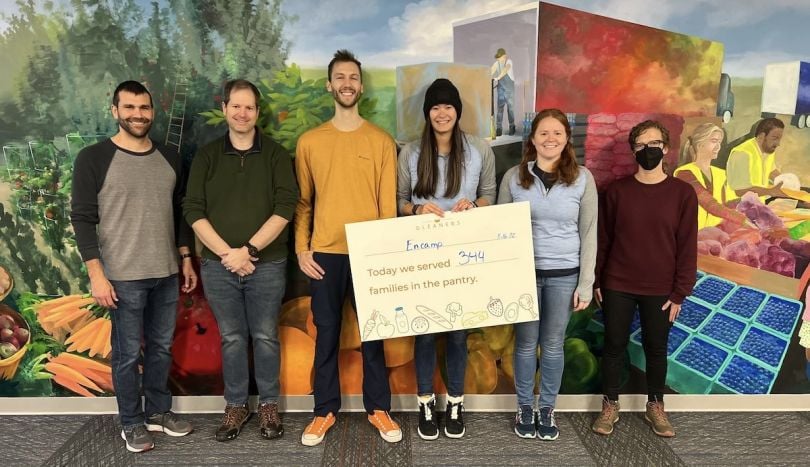In psychologist and philosopher Erich Fromm’s 1956 book, The Art of Loving, he argues that love is not a sentimental state, but an art.
Love can be learned and practiced, according to Fromm. Being a loving person is something anyone can commit to, and commit they must: Love takes effort. The art of love rests on four elements — care, responsibility, respect and knowledge.
Ward Stanford’s approach to people operations at Encamp is informed, in part, by the elements of love that Fromm laid out. Those elements are essential to building relationships in the workplace and bringing the best out of each and every employee.
Treating people with love, Stanford said, lets them be completely human.
“They can be creative, they can feel safe and they can feel like they’re a part of something,” said Stanford, VP of people operations and talent. “All of those things create great intrinsic motivation for people and the kind of place that people want to be.”
Encamp certainly is that place. Ninety-four percent of its employees feel a sense of belonging at the company.
Cultural values of kindness, compassion, empathy and understanding shape how Encampers are treated — like the human beings they are. A focus on their humanity allows for an emphasis on ownership, growth and individuality.
To Stanford, there’s no other way to do it.
Ninety-four percent of Encamp employees feel a sense of belonging at the company.
A sense of family
When Jennifer Collins worked for the Indiana Department of Environmental Management, she met Luke Jacobs, Encamp’s co-founder and CEO. After a brief initial conversation, she could see the possibilities for record-keeping and reporting solutions that Encamp could provide for consultants like her.
While consultants she knew did their best to help businesses with their regulatory needs, those companies became reliant on consultants to do their environmental, health and safety work for them. With Encamp, businesses could become self-reliant. She loved the product. Encamp’s core values were a selling point for Collins, too.
“In the state environment, it was very much a dictatorship mentality,” Collins said. “People were afraid to share their ideas; they were afraid to do anything new. It was by the book, and it really just squashed any creativity that was trying to occur.”
What Encamp Does
Encamp wants what’s good for business to be good for the environment. The enterprise tech company helps organizations improve their environmental compliance operations with high-tech solutions and expert support.
In 2020, she interviewed at Encamp, but the pandemic stalled her dream of working there until she saw the opportunity to apply for a technical solutions manager position that fall.
From the start, she felt valued. The interviews didn’t feel like interrogations; instead, it was a relationship-building process. The conversations centered on her values and how they fit in with Encamp’s mission as a company.
“They value us being able to be humans, that we have families, that we have people who will possibly be in a meeting with us, too.”
As she completed a demo, one of the interviewers held his baby on his lap. Collins, a mother of two, loved that as he asked her questions, he bounced the baby up and down.
“I just felt a sense of family,” Collins, now an account manager, said. “They value us being able to be humans, that we have families, that we have people who will possibly be in a meeting with us, too.”
Leaders are cultural pillars
According to Stanford, Encamp’s environment and culture start with leaders who create “microenvironments where people can thrive.”
Director of Accounts Sam Schroeder has benefited from such a microenvironment, and she’s created one, too. When she joined Encamp, Schroeder worked in customer success. But she saw a need for a technical solutions team, and Encamp gave her the space to build that team from the ground up.
Schroeder credits the team’s metamorphosis, and her own, to Encamp’s supportive culture.
“The overall encouragement and knowing that you can try something, figure it out and make it your own allowed me to expand into areas I never envisioned for myself and has brought me a lot of success,” Schroeder said.
In turn, Schroeder encourages her team in the same way, and she infuses her leadership with Encamp’s values. She’s created a team culture where members take ownership and follow Encamp’s values, like “seek truth, not comfort,” which allows employees to speak their minds knowing they’ll be treated with kindness.
A Note on Well-Being
Encamp’s wellness initiatives don’t focus on just getting steps in. They of course encourage physical wellness, and Encamp brings in guest speakers like doctors and those who have unique health journeys and practices. But Encamp also looks at holistic mental health and stress reduction and a sense of flexibility that allows employees to attend to their personal lives as things inevitably come up. “Wellness is not just physical, mental and social health, but also the ability to be a complete person every day.”
“We have this culture where we allow people to play, and that means not only having fun at work, but also literally an ability to try things, make mistakes and communicate with each other to push something in a different direction,” Stanford said.
That environment, like Encamp’s focus on kindness and empathy, creates a space where people want to be because they can envision their growth. In turn, employee growth pushes Encamp even further.
“It changes the offerings that we have,” Stanford said. “The product itself, the way we’re set up and what we do continues to change and iterate because of our culture.”

Space to belong
Collins, Schroeder and Stanford see belonging at Encamp materialize in different ways, but they can all agree that they feel it deeply and individually.
Where do you see belonging and inclusivity at Encamp?
Collins: In the team. We have opportunities to celebrate together, and it always feels so good to see those celebrations. Even though we’re a digital workforce, we’re seeing it on Slack channels and coming together on Zoom.
Schroeder: We have virtual coffees where you are partnered up with somebody outside of your team. That fosters great relationships that extend beyond projects and allows us to recognize people as individuals, and also as Encampers. I see this when we get together for in-person events. There’s no sense of awkwardness and everyone is excited to either see their friends or coworkers, or see a new coworker who they haven’t had a chance to meet in person yet. There’s this sense of overall belonging and knowing your peers in a way that I have never experienced before, even working in person.
Stanford: I’ve mostly worked at in-person companies, and what ends up happening is you homogenize toward whatever you feel like the company wants you to be. What’s nice about Encamp, not only is it remote, but it’s purposefully remote, yet it shares a set of core values. I get to be whatever weird thing I am. I can come to Encamp with all of me. Because we have that shared mission and those shared values, we can enjoy and appreciate our differences. It’s not just diversity and belonging, but it’s trust that we all care about the same things.
Wonderful Weirdness
Three feet from where Stanford sits is a cardboard cutout of Danny Devito. Somewhere, likely getting into trouble, are Schroeder’s two puppies, which she adopted within two months of each other. In the next room over, Collins’ two kids are taking virtual classes. “I’ve got some sort of screaming going on sometime during the day,” she said.
How do you feel a sense of belonging at Encamp?
Stanford: This is the first place I’ve worked where I’ve been able to use the totality of my education and experiences to positively impact the business at every level. That makes me feel connected to the company and like I made the right choice in coming here.
Schroeder: I feel like I can walk into any room, so to speak, share an idea, and it’s received. It doesn’t always mean action is going to be taken, but everybody respects one another’s insights. It’s not isolated to this one subset of the organization; you feel like you belong to Encamp as a whole, not just your department.
“I feel like I’m home here.”
Collins: I believe so passionately in the product and the ultimate goal that we have to help people and the environment. Everything that I’ve ever learned has brought me to this point of being able to help build and sell this product. I feel like I’m home here.







